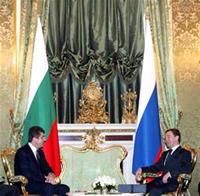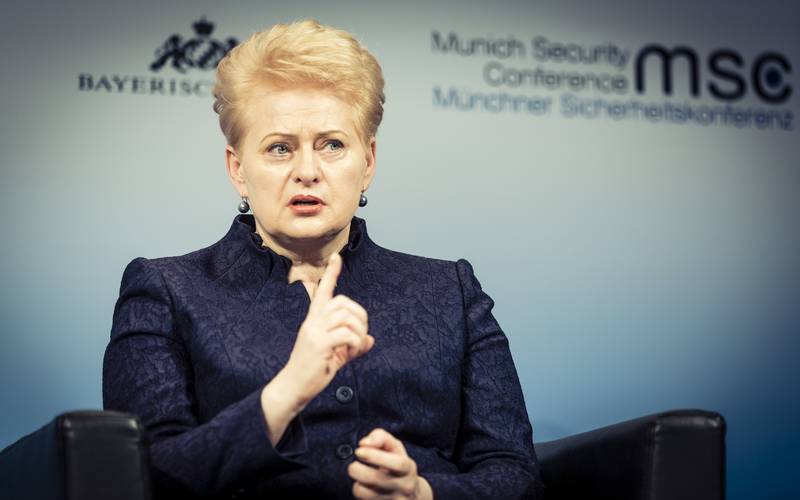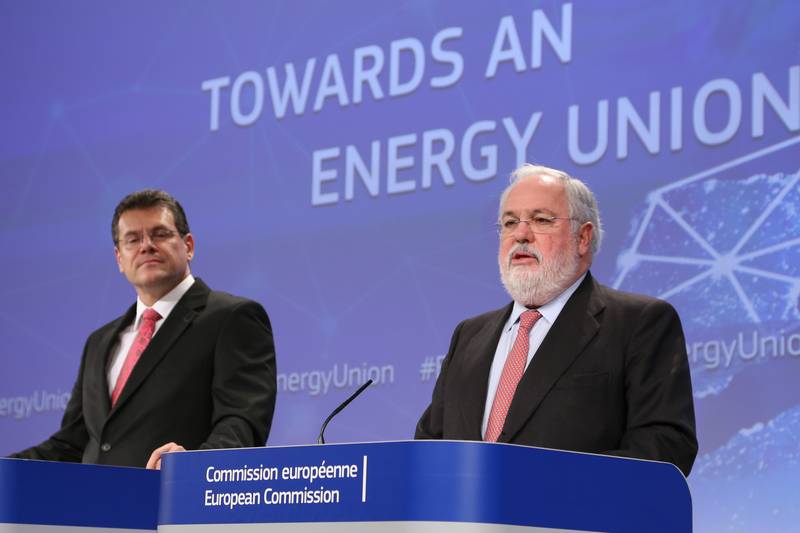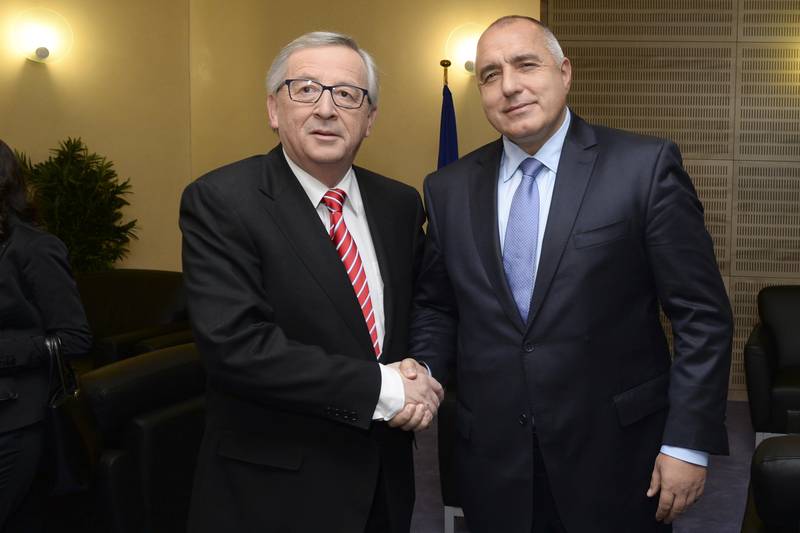Sofia is speaking. But is Moscow listening?
Ralitsa Kovacheva, March 2, 2010
 Bulgaria has a problem in its relations with Russia. This became visible again around the dispute to build or not to build a second nuclear power station project, which will be financed with Russian money. If we leave aside the very reasonable rebukes towards the government that the deal is being negotiated in total darkness in terms of parametres and future benefits, it could easily be seen that one of the main arguments of the opponents of the deal is the "Russian connection". After half a century long Soviet domination and given the historical Bulgarian-Russian relations, such fears are very well-grounded. But for 20 years Bulgaria is an independent country, which has reached full age, so it is supposed to be able to call things by their real names and to be able to recognize its problems clearly.
Bulgaria has a problem in its relations with Russia. This became visible again around the dispute to build or not to build a second nuclear power station project, which will be financed with Russian money. If we leave aside the very reasonable rebukes towards the government that the deal is being negotiated in total darkness in terms of parametres and future benefits, it could easily be seen that one of the main arguments of the opponents of the deal is the "Russian connection". After half a century long Soviet domination and given the historical Bulgarian-Russian relations, such fears are very well-grounded. But for 20 years Bulgaria is an independent country, which has reached full age, so it is supposed to be able to call things by their real names and to be able to recognize its problems clearly.
But no. Sofia is still continuing to behave like a grown up child towards its very powerful mother (Moscow): it is both rebelling and afraid. It is trying to wring out from its protection but uncertain, like a teenager, it runs away only to return even more obedient. Of course, politicians do not admit that there is a problem just like people who are ashamed to say they have not read a very popular book or that they do not understand it. This should not be shameful at all because Bulgaria is not the only one who has a problem with Russia.
In a report Katinka Barysch, deputy director of the Centre for European Reform makes a very strong critical analysis of the common European policy.
strong critical analysis of the common European policy.
The EU now is better able to speak with one voice to Moscow. But it is not clear what the message should be.
And why, given that it is an EU member state and also has a problem with its relations with Moscow, Bulgaria does join the joint search of a message? Furthermore, there is a significant difference: Bulgaria knows what it has to say to Moscow but it does not know HOW to say it.
If we go back to Katinka Barysch's publication, she analyses the new formulation of the Euro-Russian relations, launched in 2008 - "modernisation partnership" (which replaced the model of the "strategic partnership). The idea is the Union to assist Russia with capital, technology and training. And the presumption is that a modernized Russia could be more pro-Western, more open and more accommodating. And while on a EU level this partnership is only a phrase, countries like Germany and France have for a long time bilateral "modernisation partnerships" with Russia. The reason, according to Ms Barysch, is the weak dynamics of the democratic and market reforms in Russia.
Unless Russia is really ready to reform, any modernisation partnership would be limited to a few government or EU-led co-operation programmes. But they would hardly be enough to help transform the Russian economy or give momentum to EU-Russia relations.
But how possible it is for Russia to reform? Barysch describes a process of Brezhnevisation of Putin's Russia, comparing it to the Soviet Union of Brezhnev in the 70-s: the regime of Putin is already too rigid to allow the big and broad changes necessary for the country. And according to the analyst Fyodor Lukyanov,
Russians see the EU as a reservoir of money, skills and technology; not as a model on which Russia will ultimately converge. If the EU was serious about helping Russia to reform, the result could either be a Russia that is stronger, but not necessarily easier to deal with; or a Russia
that has been destabilized by radical change that undermined the Putin regime.
The question is to what extent today's Russian leaders can and want to reform their country to make it a competitive market economy, to impose rule of law and personal freedom. And while president Dmitry Medvedev is launching these values, the prime minister Vladimir Putin is working out the thesis about the "Russian conservatism" and about the need of a state control over the economy.
The economic crisis may have cost many oligarchs their fortunes but it pushed the share of the
economy controlled by the state to over 50 per cent. Top officials close to Putin now govern many of the largest enterprises. The middle classes – who in many emerging economies are in the forefront of arguing for better property rights and more personal freedoms – are apathetic. Too many owe their relative comfort to state employment or handouts. Since Russia’s democratic institutions function badly, the whole system is precariously balanced on the whims of Putin and his small circle.
 Bulgaria knows these "whims" very well. Let us remember Putin's energy offensive, called by Bulgarian president Gheorghi Parvanov a "Grand Slam" (the projects South Stream, Belene nuclear power plant and Bourgas-Alexandroupolis oil pipeline). Bulgarian-Russian energy relations in recent years are probably the most telling example of the lack of a clear Bulgarian position towards Moscow as well as of the lack of tools to defend it. For the past three years, however, Bulgaria has an alternative - its EU membership gives the country the opportunity to speak with the single European voice. And not as Sofia is doing currently - chanting.
Bulgaria knows these "whims" very well. Let us remember Putin's energy offensive, called by Bulgarian president Gheorghi Parvanov a "Grand Slam" (the projects South Stream, Belene nuclear power plant and Bourgas-Alexandroupolis oil pipeline). Bulgarian-Russian energy relations in recent years are probably the most telling example of the lack of a clear Bulgarian position towards Moscow as well as of the lack of tools to defend it. For the past three years, however, Bulgaria has an alternative - its EU membership gives the country the opportunity to speak with the single European voice. And not as Sofia is doing currently - chanting.
And here is how, according to Katinka Barysch, a possible EU-Russia dialogue could look like in the field of gas deliveries:
Against the backdrop of heightened uncertainty in global gas markets, Russia may become a more forthcoming negotiating partner in energy. If the EU offers ‘security of demand’ (meaning that the big European energy companies stick to long-term contracts with some sort of predictable pricing formula), Russia may compromise in other areas.The EU may want to ask Russia why it wants to build the expensive and technically complex South Stream pipeline rather than, say, use Nabucco to transport Russian gas to South Eastern Europe. Russia will need western capital and know-how to develop difficult new gas fields. The EU still wants Russia to accept joint principles on energy sector investment and transit.
If we go back to Bulgaria, isn't it the perfect context the common energy projects with Russia to be put in, together with the gas deliveries' contracts, which currently are covered in thick fog and demagogy and Moscow has the opportunity to use them as a tool for political pressure? If Bulgaria can make its energy relations with Moscow part of the European ones, the country will be able not just to formulate more clearly and firmly its demands. It will also be able to set conditions. Because, as Katinka Barysch writes in conclusion in her publication,
The EU should also tone down its rhetoric on strategic partnership and put more effort into transmitting a clear and consistent message to Russia. The message should be that the EU stands ready to move forward on deeper integration and more extensive co-operation with Russia. But it wants to see progress on economic reform as well as human rights and political freedoms. The EU must show determination regarding the common neighbours, especially regarding Russian criticism for the Eastern Partnership - it must state clearly that the EU cannot and will not accept any Russian claims to a sphere of influence. The countries in that region have the right to define their own destiny. The EU must, however, be careful not to adopt the kind of zero-sum approach that many Russian policy-makers display, for example by appearing to allow the likes Belarus and Ukraine to participate in EU programmes only if they pursue the ‘right’ stance towards Russia.
Isn't this exactly what we want Sofia to tell Moscow?
 Dalia Grybauskaite | © MSC/Koerner
Dalia Grybauskaite | © MSC/Koerner Maros Sefcovic, Miguel Arias Canete | © European Commission
Maros Sefcovic, Miguel Arias Canete | © European Commission Jean-Claude Juncker, Boyko Borissov | © European Commission
Jean-Claude Juncker, Boyko Borissov | © European Commission